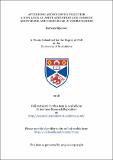Attending and knowing together : a new look at joint attention and common knowledge and their role in coordination
Abstract
Joint attention—the ability to coordinate attention to an object or event—is a key feature of human social cognition. Without joint attention, we would not be the cooperating species we are now. Most developmental studies focus on when joint attention emerges, rather than what joint attention actually is, and what consequences it has for different types of interactions. To address this gap, Part I of the thesis provides a new look at joint attention, presenting a systematic framework of four attention levels (from monitoring, to common, mutual, and shared attention) with corresponding distinctions for the knowledge states associated with each level. Cognitive, behavioral, and phenomenological aspects of the different levels are discussed, as well as the functions and consequences the levels have in terms of what kinds of obligations they can support. Part II of the thesis follows on from this in investigating the role of joint attention in facilitating coordination. In two studies, 5- to 7-year-old children played a Stag Hunt coordination game in which they needed to decide whether to cooperate or play individually. During the decision-making phase, the children’s partner either shared attention with them—she made ostensive, communicative eye contact—or looked non-communicatively at them. In Study 1, results showed that communicative looks produced an expectation of cooperation in children. In Study 2, children normatively protested when their partner did not cooperate, thus showing an understanding of the communicative look as a commitment to cooperate. This is the first experimental evidence, in adults or children, that in the right context, communicative, but not non-communicative, looks can signal a commitment. Thus the thesis highlights the special importance of the shared attention level in supporting cooperation
Type
Thesis, PhD Doctor of Philosophy
Collections
Items in the St Andrews Research Repository are protected by copyright, with all rights reserved, unless otherwise indicated.

